No products in the cart.
Backtracking to Forge Ahead – Part 4
I don’t know what the experience of St. John’s College would have been like if I had enrolled just after high school. What I remember most vividly about that season of my life – I graduated in 1995 – was relief that high school was finally over, frustration at having no particular idea of what was next, and pressure to attend college. Because of all this, a vague fearful confusion, a numb tunnel-vision, settled over my brain. I felt paralyzed. Outwardly, I was very passive; inwardly I was angry.
My life would have been more enjoyable and more productive if I had known myself. And the next best thing to knowing oneself is to have a good mentor. Parents can become mentors to their children, but this is not always possible. A good mentor would have looked at me and said, “you’re not ready for college. Let’s find out what you should be doing.” I didn’t know what to choose, so I followed the system. I have often thought how strange it is that our culture values Choice above everything else, but it gives us very few tools and very few opportunities to make excellent choices.
The only clear thought in my mind prior to entering university was I do not want more education. But more education seemed the only available course. Consequently, I found myself attending with less than half a heart, not wanting to be there or anywhere, wasting my own (and many others’) time and money, and doing damage to my soul at what could have been a period of great creativity. I now often recommend to high school graduates and to their parents that they find alternate and creative ways to get experience and perspective. Education is, after all, most effective as a supplement to experience. Get the experience and it will be and it will lead to the education. Go out and be physical for a season: travel, farm, learn a trade, volunteer. I went to university through fear of wasting time, and consequently I wasted several years.
With one semester completed, I am now an eighth of the way through the program at St. John’s. The gap in these posts is due to a combination of being busy and school and of considering what to write next. What has prompted this reflection is that I see myself in my fellow freshmen – most of whom are recent high school graduates, 18 or 19, hopeful, unsure, intelligent, inexperienced and ungrounded. Our class is smaller than most, and this gives us an intimacy and sense of togetherness even stronger than is usual at St. John’s, where the intensity of the course work necessarily creates a bond.
My first turn through higher education at a huge state school forced me to hunt for a social group, literally by trial and error. Here, the social group is the whole class. No one at St. John’s came by coincidence excepting a few students whose parents attended and who never considered anything else. While this makes the campus atmosphere very different from other institutions, the students still arrive as typical American teenagers: too much television, monolingual, morally ambiguous, nominally religious.
What strikes me most about them, though, is their potential. These are amazing people. They could become anything, go anywhere. I can already see that some (like myself at their age) should have chosen to do something other than college. Still, this does not mean they will fail ultimately. It simply means that their education will be caused by school, rather than supplied by school.
My lack of focus and consequent failure at university forced me to grow up and look for opportunity elsewhere. I didn’t try and fail, I failed because I didn’t try. But I didn’t fail at something my heart longed for, and this was certainly a grace.
If I could speak to my fellow classmates candidly, I would tell them that St. John’s is unique and that they should give it every ounce of focus that they can muster. But I would also tell them a bit of my story – that I dropped out of university and that it was the best choice I could have made at the time. Life doesn’t end when we step off the expected track. I would tell them that American culture wounds us all in subtle ways, and that it takes time to find exactly how these wounds affect us and how to heal from them. I would strongly suggest that they look for mentors – whether teachers, pastors, parents, aunts and uncles, or anyone already working in a field or career of interest. I would recommend that they stop worrying about finding romantic relationships and look for good and faithful friends.
Despite the differences in age and experience, I do not feel isolated or out of touch. I do not feel privileged or advantaged. I have problems now that I did not have at 18. I am benefitted by a little more calm and a little more good humor. But my brain is less adept than it once was at acquiring new skills, so I have to work just as hard as anyone to keep up. If this first semester is an indication of what is to come, these will be rich and fruitful years for the whole Class of 2017.







